Elizabeth Spann Craig's Blog, page 148
October 6, 2013
Concrete Tips for Developing an Appealing Voice in Your Fiction
by Jodie Renner, editor, author, speaker
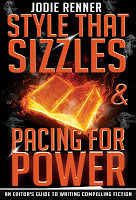
What exactly is “voice” in fiction?
An engaging story “voice” captures us
from the first sentence and beckons us into the story world. Literary agents
and acquiring editors always say they’re looking for fiction with a
captivating, fresh, natural voice. Then when asked to define the term, they
hesitate as they try to capture the elusive “je ne sais quoi” qualities of a
voice that is unique and original, a voice that engages readers and compels
them keep reading.
In a nutshell, the ideal
“voice” is that natural, open, charismatic tone and style that pull us in and
make us feel like we know the characters well — and want to get to know them
better! A strong, compelling voice will bring your characters and story to life
on the page. Voice is personality on paper.
How can we develop an appealing voice?
Here are some concrete tips to help you
develop a captivating voice for your fiction.
~ Relax your writing and let it flow.
Many of my editing clients are (retired)
professionals or academics who want to try their hand at writing fiction. I
help them shake off the constraints of their formal, “correct” writing
background, especially if it includes graduate degrees and a lot of legal,
academic or business writing. With my guidance, they develop a more casual,
accessible, appealing voice and tone for their fiction.
If your writing tends to be overly
correct and/or wordy, you’ll need to concentrate on paring down those long,
convoluted sentences and replacing abstract or pretentious words with strong,
concrete, evocative ones. Focus on writing in a clear, direct, accessible,
casual style that evokes the senses and appeals to the readers’ emotions.
~ Write to one person.
To help develop an intimacy with your
readership and a conversational tone, create or choose one single person you’re
writing to, who is warm, friendly, open to your ideas, interested, and
intelligent.
Create an ideal reader. Write a brief
description of their age, gender, background, home and work situation,
personality, and interests (which of course include reading your kind of
writing!). Get to know them a bit by giving them some positive attributes that
will help you feel comfortable and open with them. Then target your writing to
this person. Relax and let the real you come through.
~ Read and imitate writers whose voice you really enjoy.
Don’t copy their words verbatim, of
course, but immerse yourself in their story world, told in their unique voice.
Read their books aloud to really internalize the rhythm of their language, the
phrasing and expressions and word choices that appeal to you so much. Then of
course adapt the cadence and rhythm and attitudes and vocabulary to your own
situation.
~ Write a chapter in first person, then change it to third person.
One author whose voice I love is Janet
Evanovich, whose spunky, quirky heroine, Stephanie Plum, narrates her story in
first-person point of view. But it’s hard to write first-person well, and it
can be limiting, as you’re confined to scenes where this character is present.
Also, first-person isn’t always the best choice for, say, a thriller, as you
want other viewpoints in there, too, notably that of the antagonist.
But try writing several pages or a
chapter or two in first-person (“I”), to develop your main character’s unique
voice, then just go back and rewrite them in third person (he/she), with as few
other changes as possible.
~ Read your story out loud to test its authenticity and easy flow.
Your writing should have the rhythm and
comfortable familiarity of spoken language. If it doesn’t flow easily, go in
and streamline the language to take out the convoluted sentences, clunky
phrasing, and fancy-shmancy words. Or hire a trusted writer friend or reputable
freelance editor to go through it for you to take out anything that sounds too
formal, wordy, or erudite.
~ Write in deep point of view or close third.
This means the story is unfolding mainly
through the thoughts and reactions and emotions and attitudes of your
protagonist. Even descriptions of your setting should be filtered through your
protagonist’s (or other viewpoint character’s) preferences, views, and mood.
This ensures that your whole novel has a great, unique voice, not just the
dialogue.
~ Give each character his or her own voice.
When you’re writing dialogue, each
character should sound different, with their own unique speech patterns, word
choices, and slang or pet expressions, based on their milieu, upbringing,
education, and personality. For help with this, listen in on all kinds of
conversations, both in real life and on TV and in movies.
Develop an ear for how different people
speak. To improve the idiosyncratic speech of a character in your novel, try
journaling in their voice, in first person. Just write freely, using lots of
attitude! Eventually, you’ll get into their rhythm and find the words that seem
to suit them best.
~ Add emotions and attitude.
Bring your characters and scenes to life
by showing your character’s feelings and reactions to things. Evoke as many
senses as you can to draw the reader into the story world. And show your
character’s moods and attitudes not only through her words, thoughts, and
actions, but also through the tone and wording of the narration, which is
really her observations of and reactions to the people and events around her.
So break free from the constraints of
your background, education, and any work-related writing, and write the story
only you can write, with your unique experiences and personality, in your own
direct, open, interesting voice. Don’t hold back — relax and reveal yourself.
Copyright © Jodie Renner, September 2013
- Readers – Can you share some novels
where you’ve particularly enjoyed the voice?
- Writers – Do you have any more tips for
finding an authentic, appealing voice?
[GIVEAWAY: Jodie will
gift an e-copy of one of her books to two lucky people who comment
below. Please specify in your comment whether you'd prefer "Sizzles" or
"Thriller." Good luck!]

Jodie
Renner, a freelance fiction editor specializing in thrillers and other
fast-paced fiction, has published two books (& e-books)to date in her
series, An Editor’s Guide to Writing Compelling Fiction: WRITING A KILLER THRILLER and STYLE THAT SIZZLES & PACING FOR POWER (Silver Medal winner in FAPA Book Awards, 2013). For
more info, please visit Jodie’s author website or editor
website, or find her on Facebook
or Twitter.
Published on October 06, 2013 21:01
October 5, 2013
Twitterific
by Elizabeth S. Craig, @elizabethscraig

Twitterific links are fed into the Writer’s Knowledge Base search engine (developed by writer and software engineer Mike Fleming)
which has over 23,000 free articles on writing related topics. It's the search
engine for writers.
November 13-14: Get
Read – Marketing Strategies for Writers: Dan Blank’s We Grow Media is a two-day online conference for authors looking
for promotion strategies--and, ultimately, readers. Speakers include Porter
Anderson, Chuck Wendig, Dan Blank, Jane
Friedman, Therese Walsh, and many
others. (I'm one of the scheduled
speakers and am also am serving on the advisory board.) More information about the conference and
registration information can be found here.
If you use the discount code elizabeth, you receive $20 off the conference price.
There's a new
resource for writers—whether you’re writing your first book, trying to query
agents or editors, or whether you’re working on promo. It’s Alex J. Cavanaugh’s Insecure
Writer’s Support Group website. There you’ll find pages of links to
resources—writing tips, publishers, agents, queries, self-publishing,
marketing, contests, and publications for writers. Alex is a friend and
frequent commenter here and very active in supporting writers. Thanks to Alex
and his helpers for compiling the information for the site.
6 steps to creativity: http://dld.bz/cRwPQ @authorterryo
New Site Links to Writing Tips; Pubs,
Agents, Queries; Self-Pub; Marketing; Contests; and Publications: http://dld.bz/cRCMS @AlexJCavanaugh
Murdering sleeping victims in crime
fiction: http://dld.bz/cRwY3 @mkinberg
Unforgettable Picture Books: http://dld.bz/cR8Ev @womenwriters @cerrieburnell
Characters: Wealth and Glamor: http://dld.bz/cR8QJ @camillelaguire
Suddenly, conferences are all about the
writers: http://dld.bz/cRA2u @Porter_Anderson
@jpfine @psexton1
Tension-producing confrontations between
characters in crime fiction: http://dld.bz/cRCCH
@mkinberg
Novel Revision: Twenty-page Sessions : http://dld.bz/cRE4u
Trendy Hotel Wants You to Finish Your
Novel in One of Their Rooms: http://dld.bz/cRE5e
@theAtlanticWire
A free directory of cover designers,
formatters, freelance editors, and more: http://bit.ly/nolbXq
The Search Engine for Writers: http://hiveword.com/wkb/search
4 Ways to Improve Your Writing: http://dld.bz/cPz2m @ava_jae
How to handle personal attacks on social
media: http://dld.bz/cQtW4 @ellynangelotti
There is no perfect publisher: http://dld.bz/cQvsc @literaticat
10 Rules for Writing New Adult Fiction: http://dld.bz/cQ4Jd @cathinnorway
Thinking or doing--what's more important
for creatives? http://dld.bz/cQBMV @tannerc
Why Your Blog's About Page Is Completely
Wrong: http://dld.bz/cQBQF @JFBookman
The Grief Writer: http://dld.bz/cQd8K @elephantjournal
Five Words to Eliminate from Your
Writing: http://dld.bz/cRcAF @SandraPeoples
Make sure every scene accomplishes at
least two things: http://dld.bz/cRcBr
@projectmgmahem
Being "good enough",
creatively: http://dld.bz/cRcB2
@tannerc
"Don't ask what I'm writing." http://dld.bz/cRcDf @NYTimes
Author Taglines: http://dld.bz/cRcDx
Use Alltop to quickly go through ebook
and publishing news: http://dld.bz/cRcD5
@ebookfriendly
16 Ways to Get Motivated and Break out of
the Slump: http://dld.bz/cRcDA @brianleeshl
Intuitive Writing: http://dld.bz/cRcDD @juliegray
The Art of Writing Great Google+ Posts: http://dld.bz/cRcDG @copyblogger
7 Clever Tricks to Help You Edit Your
Ebook: http://dld.bz/cRcDP @thewritelife
The Problem with Writing About People You
Know, and 3 Ways to Solve It: http://dld.bz/cRcEj
@Write_Tomorrow @write_practice
3 Ways to Simplify Your Writing Life: http://dld.bz/cRcEx @lydia_sharp
How to Write Effective Endings: http://dld.bz/cRcE2 @ava_jae
5 Ways to Describe Emotions Without
Making Your Character Feel Too Self Aware: http://dld.bz/cRcEH
@Janice_Hardy
Do You Know Your Story's Subtext? http://dld.bz/cRcER @jamigold
25 Blogging Tips for Fresh Bloggers: http://dld.bz/cRcEW @ryanhussey
7 Deadly Sins of Prologues: http://dld.bz/cRcEY @KristenLambTX
Passion: How To Tap Into Yours Every Time
You Write: http://dld.bz/cRcF9
@livewritethrive
How 1 author sells 70-75 books a day: http://dld.bz/cRnG6 @LauraPepWu
Marketing for Introverts: http://dld.bz/cRnG9 @Laura_Gallier
Crime writing--poisons: http://dld.bz/cRnHA @karencv
Common issues in academic writing: http://dld.bz/cRnHB @laurelgarver
In writing, there is no recipe: http://dld.bz/cRnJv
The 3 Pillars Of Selling More Books: http://dld.bz/cRnJx @ebooksandkids
@digibookworld
Exploring Story Concepts Prior to
Writing: http://dld.bz/cRnJP @fictorians
Literally vs. Figuratively: http://dld.bz/cRnJQ @brianklems
What being married to a non-reader has
taught one woman: http://dld.bz/cRnJW
@kelleemoye
Nannies featured in crime fiction novels:
http://dld.bz/cRnKf @mkinberg
WOOL & Brilliant Marketing: http://dld.bz/cRnKh @juliemusil
The Truth About Writing Advice: http://dld.bz/cRnKk @ava_jae
4 Famous Rejections to Give Any Aspiring
Writer Hope: http://dld.bz/cRnKm @paperblanks
Emotionally Investable Characters: http://dld.bz/cRnKn @YAMisfits @LylaWrites
4 Tips to Write a Novel That Will Be
Adapted Into a Movie: http://dld.bz/cRnKr
@write_practice @monicamclark
Making Time to Write: http://dld.bz/cRnKu @losapala
Female Characters in Fictional Roles: http://dld.bz/cRnKw @mooderino
5 Steps for Restarting Your Book
Marketing Efforts After a Break: http://dld.bz/cRnKz
@duolit
Using Taste to Further Your Fiction: http://dld.bz/cRpbR @JodiLMilner
A guide to creating better blog content: http://dld.bz/cRpca @aliventure
Setting Free the Poets: http://dld.bz/cRpcK @asheresque
1 writer/illustrator's love-hate relationship with rejections: http://dld.bz/cRpdg @MiGWriters @inkyelbows
10 Evil Gremlins of Writers Block Doom a
Good Story: http://dld.bz/cRpdm
@AdriennedeWolfe
Writing Short and Funny for the Internet:
http://dld.bz/cRpdq @scriptmag
@StephanyFolsom
Top 10 mold-breaking fantasy novels: http://dld.bz/cRpdv @guardianbooks
11 things happy authors don't do: http://dld.bz/cRpdx @rachellegardner
Embedding Sensory Details in Your
Writing: http://dld.bz/cRpdy @julie_gray
Feminism in Romance Novels: http://dld.bz/cRpd3 @IzzyFarhi
Write, Direct, Repeat: Working with Line
Producers: http://dld.bz/cRpdC @scriptmag
@kim_garland
No Words on the Page, But We're Still
Writing: http://dld.bz/cRpdJ @fictionnotes
The Amazon Ad That Scared The Crap Out Of
Apple's Top Executives: http://dld.bz/cRtnr
@passivevoiceblg
Forget the Facts, Tell a Story: Why
Braveheart is a Classic Despite its Inaccuracies: http://dld.bz/cRtnB
@worldsofstory
On Keeping a Notebook: http://dld.bz/cNNhm @SarahNumber4 @parisreview
Twitter for Authors: Book Marketing and
Publicity with Social Media: http://dld.bz/cRtnG
@PublishingGuru
10 Ways to Defeat Obscurity: Tips for
Authors Who Want to Get Noticed: http://dld.bz/cRtnW
@writerplatform
Atypical Protagonists: Six Anti-Heroes
From Great Works of Fiction: http://dld.bz/cRtpb
@readlearnwrite
Getting Back to Work and into the Rhythm
of Writing: http://dld.bz/cRtpc @noveleditor
Reward yourself for writing: http://dld.bz/cRtpe @JennaAvery
Why Writing Horror Is–And Should Be–Hard:
http://dld.bz/cRtxt @kevinlucia
10 Tips for Critiquing Other People's
Writing: http://dld.bz/cRtx2 @writing_tips
10 great books that made awful movies: http://dld.bz/cRtNd
Literary Agent Says TV is Where it's At: http://dld.bz/cRtRs @NYFA
Why 1 Christian writer isn't interested
in writing Christian fiction: http://dld.bz/cRtR4
@kevinlucia
The 20 Best Books in Translation You've
Never Read: http://dld.bz/cRtRD
@publisherswkly @chadwpost
Good Quotes on Life, Writing and Art: http://dld.bz/cRtRT @artsylliu
15 Ways to Move Forward Faster as a
Writer and Author: http://dld.bz/cRtRW
@ninaamir
How to Make a Depressed Character
Likable: http://dld.bz/cRtSn @janice_hardy
One frequently negative reviewer decides
to 'bury the hatchet': http://dld.bz/cRtSv
@pageturner
There are no shortcuts to mastering our
craft: http://dld.bz/cRtSA @EdieMelson
@novelrocket
25 ways to improve your writing in 30
minutes a day: http://dld.bz/cRtSR
@RitaKarnopp1
How 6 of 1 Writer's Books Became Amazon
Best-Sellers in 1 Month: http://dld.bz/cRtTe
@KMLoganWriter
How to Avoid the Slush Pile: http://dld.bz/cRtTM @stefanvucak
7 Ways To Integrate Your Writing &
Your Day Job: http://dld.bz/cRtTR
@LittleReadings
10 personal essay writing ideas: http://dld.bz/cRxau @nytimes
How to Craft Perfect Posts for Facebook,
LinkedIn & Twitter: http://dld.bz/cRxaK
@hubspot
How to Make the Most of Your Chapter
Endings: http://dld.bz/cRxaS @ava_jae
The Rule of Twenty: http://dld.bz/cRxaU @authorterryo
The Johnny Cash Approach to Novel
Writing: http://dld.bz/cRxen @bentguy1
A Career Versus Publication: http://dld.bz/cRxeR @kristinerusch
7 Ways to Get Extra Mileage From Your
Blog Posts: http://dld.bz/cRxfx @heidicohen
4 Tips on the Publishing Experience: http://dld.bz/cRxkq @writersdigest
Sci-Fi Storytelling for Screenwriters–
Structure, Budget, & What's Next: http://dld.bz/cRxkt
@scriptmag
The Character Therapist: Displaced Anger
and Multiple Personalities: http://dld.bz/cRxkx
@jeanniecampbell
20 Places to Publish Personal Essays: http://dld.bz/cRxk4 @meghancward
How to Pick up Your Writing Pace Whether
You're a Tortoise or a Hare: http://dld.bz/cRxkA
@Rogenna
Creating Your Own One-Sheets: http://dld.bz/cRxkD @MBTPonderers
5 Examples of Extraneous Hyphens: http://dld.bz/cRxkF @writing_tips
A Key Book Marketing Principle That
Authors Must Learn (or Not Forget): http://dld.bz/cRxkM
@janefriedman
7 Awesome Crime-Fighting Duos In Books: http://dld.bz/cRxkT @colleengleason
The Mathematics of Writing: Is There a
Formula for Creative Success? http://dld.bz/cRxmg
What To Do Once You've
"Finished" Your Novel: http://dld.bz/cQGpA
@RoganBarbara
There is no perfect publisher: http://dld.bz/cQvsc @literaticat
Five Words to Eliminate from Your
Writing: http://dld.bz/cRcAF @SandraPeoples
50 Cliched Dialogues to Ban From Your
Script: http://dld.bz/cR8Z5 @Mentorless
Content marketing--5 Ways to Tell Stories
that Sell: http://dld.bz/cR9ae @b2community
Three Most Common Story-structure
Pitfalls: http://dld.bz/cR9am @KMWeiland
Making the Switch from Nonfiction to
Fiction Writing: http://dld.bz/cR9av
@jJodieRennerEd
5 online writing tools to boost your
productivity: http://dld.bz/cR9az
@tessawegert
Don't Let Your Characters Act Like
Idiots: http://dld.bz/cRAQa @JamesScottBell
The opening act – what the reader needs
to understand: http://dld.bz/cRAQb
@nailyournovel @KMWeiland
How to structure a premise for stronger
stories: http://dld.bz/cRAQ2 @thewritermag
How to style quotations in a novel: http://dld.bz/cRC86 @glencstrathy
6 Ways to Add Video Marketing to Your
Author Social Media Mix: http://dld.bz/cRC87
@wherewriterswin
Science fiction is no longer a boys'
club: http://dld.bz/cRC8V @salon @PolicyMic
What if Emily Dickinson attended a
writing workshop? http://dld.bz/cRC8Z
@Writers_Write
Writing Secondary Characters: http://dld.bz/cRC9d @Ventureadlaxre
@ScottLynch78
How-to conquer self doubt and write
anyway: http://dld.bz/cRC9u @thefutureisred
Exercising Your Craft: 3 Writers Who Get
Physical: http://dld.bz/cRC9w @pshares
Use multiple tools to promote your work: http://dld.bz/cRCAj @stevebuttry
US vs. the Rest: is American English
Taking Over? http://dld.bz/cRCAp
@TDMcKinnon2012
How To Turn On Your Muse: http://dld.bz/cRCAy @write_practice
Package a story pitch to catch the
editor's attention: http://dld.bz/cRCA2
@thewritermag
How to write a killer script: http://dld.bz/cRCA8 @WaleOwoade
10 Ways to Fake a Professional Edit: http://dld.bz/cRCD2 @thecreativepenn
@skolbwilliams
Writing books--with only 2 pages a day: http://dld.bz/cRCDE @writerunboxed
8 Book Marketing and Diversification Tips
to Make Money: http://dld.bz/cRCEc @karencv
The Furby Way To Make Your Script Stand
Out: http://dld.bz/cRCEd @raindance
@jurgenwolff
Writing Powerful Sentences: http://dld.bz/cRCVw @RachelPhifer1
Why Film & TV Need the Novel: http://dld.bz/cRCVA @shalvatzis
Does writing in different genres turn off
readers? http://dld.bz/cRCVC @tobywneal
Word choice: http://dld.bz/cRCW6
Author Media Kit Components: http://dld.bz/cRCYV @Girl_Who_Reads
The Audience is in Control – Give People
What They Want at a Reasonable Price: http://dld.bz/cRCZm
@passivevoiceblg
11 Creative Film Interpretations You
Probably Hadn't Considered: http://dld.bz/cRCZx
Why Book Reviews Are Important On Amazon:
http://dld.bz/cRCZ8 @JeanetteCates
6 Ways Twitter Lists Can Help Build Your
Author Platform: http://dld.bz/cRCZH
@JFBookman
Ten Commandments of Book Marketing: http://dld.bz/cRCZK @bookbuzzr
Writing emotions: http://dld.bz/cRCZQ @glencstrathy
Amazon Kindle Matchbook For Authors:
Prepare Now: http://dld.bz/cRDaP
@JeanetteCates
A Quick Tip to Drive More Sales to
Amazon.com: http://dld.bz/cRDgG @Bookgal
Issues as publishers
try edging into the "self-publishing arena": http://dld.bz/cRHg5 @OrnaRoss @Porter_Anderson
Published on October 05, 2013 21:01
October 3, 2013
What if You Have No Time to Promote?
by Elizabeth S. Craig, @elizabethscraig

I recently had someone email me asking
how he could most effectively promote if he had no time at all to promote.
I know there have got to be plenty of
writers in the same fix. If you’re new
to publishing and you start researching how to market your book, you could end
up very overwhelmed, fast.
The problem is that our books don’t sell
themselves. It’s fine not to do any
promo, but we can’t expect to be making money if we don’t.
I asked the writer how much time he
actually had. If he really had as little
as he said (which was basically no
time), I figured he could at least:
1) Be part
of a group blog in your genre with a large cast of contributing writers. There’s a big if with that, though. IF you have a decent bio at the bottom of the
post, links to your website, and preferably a book cover or a headshot to go
along with your post every month. I’ve
seen it all with group blog posts. I’ve seen bylines that only had first
names. I’ve seen no attribution at
all. I’ve seen bios that were so cutesy
that they gave no promo info at all…never linked back to a website or a
buy-link or a book page. I’ve searched on Twitter for authors of posts and came
up with several writers and had no idea which was the blogger. Pointless for someone who is trying to
promote by spending the little amount of time they have in blogging.
2) Guest
post. Guest posting on a blog
with good traffic (frequent commenters, a lot of followers) can bring you some new readers. You can decide how frequently this guest
posting will take place. I know some writers who have a regular gig
contributing to some sites…they’ll have a guest post every month or every
couple of months. Again—it’s important
to make sure your bio, links, and cover are on these posts.
3) Goodreads. This can be an intimidating place for writers
because it’s intended as a reader community and you’ll run into rough reviews
there sometimes. But it’s also a good
place to go where the readers are. So
often in our promoting, we’re networking with other writers. Set up a profile there and link to your
book. It doesn’t take long. If you have a print copy of your book (even
from CreateSpace, etc.), then you can enter your book in a free giveaway
there. Just decide how many copies
you’ll give away, if you’ll open it to international readers or domestic only,
and the dates that folks can enter the giveaway.
If you think you might have a little more
time…but not much more:
Choose a
social media platform that isn’t too intimidating for you and post
updates regularly there. You don’t have
to be on them every day and you don’t have to spend gobs of time there when you
do log in. You can choose how frequently you do it—twice a week? Once a week?
You can even use a free program like SocialOomph
to automate the process…but then you’ll need to respond to any comments for
your updates, so automation only goes so far.
Twitter and Facebook are all about interaction. Well…except if you’re
what’s considered a “broadcaster.” I’m a broadcaster on Twitter—I send out
tweets but don’t interact on my page. On Facebook, I engage in
conversations. Google Plus is another
option, although you can’t automate there.
The catch: although you’re promoting,
these updates you post don’t need to all be about your book. The key is
developing a brand for yourself and raising your online profile. So post a variety of different things—cross-promote
a friend’s book, share a news story (perhaps one that even ties in with your
book’s theme somehow if you want to tie-in), even…well, post pictures of your
pets. I hate to say that, but honestly,
we’ll get a lot less scorn and a lot more love on social media from readers if
we post pictures of our cat instead of asking people to buy our book.
Blogging?
I love blogging and having my own blog, but it’s probably not effective
for someone on a real time crunch because you should post at least
regularly…once a week at minimum I think.
That was my advice, but I’m interested in
hearing yours. If you only had a small
amount of time to devote to promo, how would you spend it?
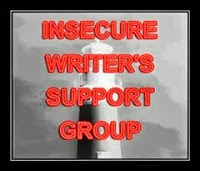
And today, I wanted to let my blog readers know about a new resource
for writers—whether you’re writing your first book, trying to query agents or
editors, or whether you’re working on promo.
It’s Alex J. Cavanaugh’s Insecure
Writer’s Support Group
website. There you’ll find pages of
links to resources—writing tips, publishers, agents, queries, self-publishing,
marketing, contests, and publications for writers. Alex is a friend and
frequent commenter here and very active in supporting writers. Thanks to Alex
and his helpers for compiling the information for the site.
Published on October 03, 2013 21:01
October 1, 2013
Novel Revision: Twenty-page Sessions
Guest Post by Jack Smith
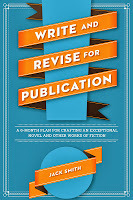
You can handle novel revision in many
different ways—probably too numerous to mention. One method: You can
rework pages one at a time, trying to get everything right before going
on. A second: You can take the novel section by section, attempting to
get everything right.
Or how about this third
method? Once you have a fairly complete draft, just commit yourself
to twenty-page sessions of revision.
Unless you hit real snags, you can do
this in about two to three hours.
Here’s the kinds of things to look
for/work for:
-Characters
that seem rather flat. What can you do to spice them up a
bit? Maybe some interesting description? Maybe an interesting
remark in a scene? (If this changes the nature of the scene too much,
this will of course require more time and effort.)
-Plot
details. Did you leave something out? Do you need to take
something out that you won’t be dealing with after all? Do you want to
echo something or foreshadow something?
-A
descriptive passage to make a setting
more interesting. Or a setting more important?
-A passage
that is confusing or cumbersome to read.
-Bloated
sections, whether expository, descriptive, or scenic where you could cut
some and achieve more impact.
-A hint at
theme or idea, whether in character thought or dialogue.
-Dull
writing that needs spiced up to fetch your reader’s interest more.
Okay: All of this sounds like the typical
fare. But what’s daunting is a long laundry list of changes you so often
face before you can put your project to rest.
But do it in twenty-page sessions where
you can make incremental progress. If you’re absolutely burned out,
do it while you’re watching TV. Do it while you’re listening to
music. Some days you will simply read over the twenty pages and not
expect to accomplish a lot because you just don’t have it in you to get very
serious. But you’ve still gone over those twenty pages, and you’ve taken care
of the kinds of problems that really jump right out at you (or some of them
anyway). Other days you’ll feel more like revising, and you can dig deeper and
make more content changes (e.g. rewriting scenes) or structural changes (e.g.
relocating a section of the novel) that seem too daunting on certain
days. On the days you don’t feel like tough work, just note what you need
to deal with later.
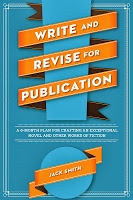 Revision at twenty pages a day is usually
Revision at twenty pages a day is usuallydoable, and it’s not a huge task to face. Over time you’ll probably
accomplish a lot. In three months, you will have gone over a 300-page
novel six times. Surely something will come of that.
Jack Smith
Write
and Revise for Publication , Writer’s Digest, 2013, and Hog
to Hog, winner of the George Garrett Fiction Prize, Texas Review Press, 2008.
Published on October 01, 2013 21:01
September 29, 2013
Speaking to Book Clubs
By Elizabeth S. Craig, @elizabethscraig
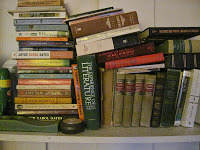 Friday I spoke to a
Friday I spoke to abook club in my hometown of Anderson, South Carolina. It was a great group and a very
well-established one—it had been founded in 1920. My grandmother had been among the early
members.
In the past five years or so, I’ve spoken
to a variety of different kinds of book clubs.
Some have been very casual with a loosely-organized program. Some have been dressy, organized events. Some have been at retirement homes. Sometimes there’s even supper involved. I’ve found that it’s good to know what to
expect before you arrive.
It’s also nice to know if you’re expected
to give a talk, for how long, and on what topics…limited to a particular
title? About writing in general? Or will the host going to introduce you and
then the club will start discussing the book and ask questions afterward?
And, as with our writing, it helps to
know our audience. I’ve spoken to book
clubs made up of a variety of different age groups…and I try to tailor my talk
to fit in more with their group. If it’s
a group of moms, I’ll talk a little bit more about trying to write a book
around children. When I talked in my
hometown, I talked about growing up there and my influences and the way the
town has figured into my writing.
Although the groups have been very
different, I’ve noticed that, mostly, their questions are the same.
The most common questions:
When do you write? How much do you write
a day? How many books do you write a year?
Do you write yourself into the books? Do
you write your children into your books?
How do you bring characters to life?
How did you get started with a publisher?
Do you like ebooks/what do you think
about ebooks/are your books available as ebooks?
How do you keep your series straight?
Do you do signings at bookstores? (And when I immediately answer ‘not usually,’
they ask ‘why?’)
How long does it take you to write a
book?
Do you write about people you know?
Do you help with your titles? With your
covers?
How many books are printed by the
publisher?
Do you write on the computer or longhand?
Sometimes I’ve spoken to groups about
writing, in general. Sometimes the talk
has been focused around a particular book. If they’ve read one of your books,
you’d better know that book backwards and forwards. I now have cheat sheets of all my books that
I can review before speaking to clubs.
I know writers who give away door prizes
at book club meetings.
And make sure that you bring books and a
pen with you. Ugh. As ridiculous as it sounds, I’ve forgotten to
bring books to sell before.
Dina
Santorelli guest
blogged here in April and had some great tips about talking with book
clubs. Among them, she recommends
bringing a mailing list signup sheet, a camera, and giving the book club a
group discount on books.
Finding book clubs can be a
challenge. I’ve heard some people have
had luck on MeetUp. I know people who have contacted retirement
homes, senior centers, bookstores, and libraries and asked if they needed
speakers at club meetings. The times
I’ve spoken with book clubs, it’s been a word-of-mouth process. Usually it’s a family member or a friend’s
club—sometimes it’s more of a friend-of-a-friend thing.
Have you spoken to any book clubs? Have any tips?
Image: MorgueFile: by MissMeganBunn
Published on September 29, 2013 21:01
September 28, 2013
Twitterific
By Elizabeth S. Craig, @elizabethscraig
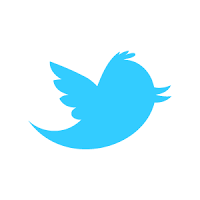
Twitterific links are fed into the Writer’s Knowledge Base search engine (developed by writer and software engineer Mike Fleming)
which has over 23,000 free articles on writing related topics. It's the search
engine for writers.
Sign up for our free newsletter for bimonthly writing tips and interviews with top
contributors to the WKB or like us on Facebook.
November 13-14: Get
Read – Marketing Strategies for Writers: Dan Blank’s We Grow Media is a two-day online conference for authors looking
for promotion strategies--and, ultimately, readers. Speakers include Porter
Anderson, Chuck Wendig, Dan Blank, Jane
Friedman, Therese Walsh, and many
others. (I'm one of the scheduled
speakers and am also am serving on the advisory board.) More information about the conference and
registration information can be found here.
4 Ways to Improve Your Writing: http://dld.bz/cPz2m @ava_jae
How to handle personal attacks on social
media: http://dld.bz/cQtW4 @ellynangelotti
Self-editing help: passive voice: http://dld.bz/cQtWC @BridgetMcKenna
5 Lit-Based Podcasts: http://dld.bz/cQtWH @chris_shultz81
Action and Reaction: The Building Blocks
of Story Structure: http://dld.bz/cQtWQ
@jodyhedlund
4 Steps To Slashing that Manuscript in
Revision: http://dld.bz/cQtWT @PatrickRWrites
All about reading royalty statements: http://dld.bz/cQtWX @JoSVolpe
How to Increase Your Views on YouTube: http://dld.bz/cQtX3 @Inu3219
Drink Caffeine Now (Or The Writer Gets
It): http://dld.bz/cQtX6 @chandlerwrites
"Storytelling Without Dialogue"
: http://dld.bz/cQtXB
Mystery with a spiritual edge: http://dld.bz/cQFKA
@stevemccutchan
Goodreads' new policy aims to reduce author bullying.
Reader reaction is swift.: http://dld.bz/cQGEP @Goodreads @Porter_Anderson
Self-publishing’s impact on the industry: http://dld.bz/cQHhJ
@jpfine @peterarmstrong @mmatting @Porter_Anderson
Twitter Guide For Authors & Illustrators: http://inkygirl.com/a-writers-guide-to-twitter/ @inkyelbows
3 contrarian views on industry changes: http://dld.bz/cRc7r
@RachelleGardner @philipdsjones @austinkleon @Porter_Anderson
5 Steps to Blogging Mastery for Fiction Writers: http://dld.bz/cRdQ2
@writerplatform @storyrally
Don't Forget Grammar in Your Social Media
Posts: http://dld.bz/cQtXG @freelancewj
Bad contracts: http://dld.bz/cQtXN @mandyevebarnett
12 Most Frequently Asked Social Media
Questions Answered: http://dld.bz/cQtXT
@12most @RebekahRadice
Fragile characters with hidden strengths
in crime fiction: http://dld.bz/cQvhH
@mkinberg
Is Your Old Blog Post an Antique or New
Content? http://dld.bz/cQvjG @jim_devitt
Common manuscript issues requiring
editing: http://dld.bz/cQvjJ @jmeyersbooks
No One Cares About Your Life Story: 9
Tips for a Better Author Bio: http://dld.bz/cQvqV
@CameronPierce
The First-Person Novel, Part I: Avoiding
Narcissism in the Protagonist: http://dld.bz/cQvrZ
@ninaamir
There is no perfect publisher: http://dld.bz/cQvsc @literaticat
How Online Reviews Can Increase Book
Sales: http://dld.bz/cQvuN
10 Questions to Ask an Agent: http://dld.bz/cQvvv @LindaEpstein
Writing A Novel: How Story Structure
Creates Foreshadowing: http://dld.bz/cQvv6
@KMWeiland
10 Daily Rituals Of Brilliant and
Successful Creators: http://dld.bz/cQvvD
10 tips for writing a book: http://dld.bz/cQvvT @woodwardkaren
5 Rules For Making A Successful Young
Adult Adaptation: http://dld.bz/cQvwn
@ThePlaylist
5 Great Monologues in Literature: http://dld.bz/cQvwy @LitStack
Steampunk: Slowly Running Out of Steam? http://dld.bz/cQvw6
Top Ten Heroes Turned Villains: http://dld.bz/cQvwD @nerdist
9 Common Film Errors: http://dld.bz/cQvwH @use_theforce_em
How a Fables Cover Gets Made: http://dld.bz/cQ4GE @tordotcom
How to read/edit editorial notes: http://dld.bz/cQ4GQ @listentomuses
Why we care about pre-orders, release
dates, etc.: http://dld.bz/cQ4GW
@magicalwords
The Business of Screenwriting: Movie
stars: http://dld.bz/cQ4Hn @gointothestory
Creative Writing Lessons from a Reporter:
http://dld.bz/cQ4Hq @DIYMFA
5 Ways To Alienate Clients as a
Freelancer: http://dld.bz/cQ4HJ
5 Focal Points for Writers Reading Books:
http://dld.bz/cQ4HT @MaloneEditorial
Taking the leap into self-publishing: http://dld.bz/cQ4HY @susankayequinn
8 Things Star Wars Can Teach Us About
Writing: http://dld.bz/cQ4Ja
10 Rules for Writing New Adult Fiction: http://dld.bz/cQ4Jd @cathinnorway
Why You Shouldn't Feel Guilty about
Taking a Nap Every Day: http://dld.bz/cQ4Jk
@rfwilliford
Writing Your Way Through Depression: http://dld.bz/cN8f9 @cateartios
5 Things To Know About Introverts: http://dld.bz/cQ4J3 @Higher_Boy
9 Things Writers Don't Talk About: http://dld.bz/cQ6xR @losapala
Are Novelists Too Wary of Criticizing
Other Novelists? http://dld.bz/cQ6yh&
@nytimes
How to Write a Captivating Blog Title: http://dld.bz/cQ6y8 @MarcyKennedy
Finish your book before querying it: http://dld.bz/cQ6yK @behlerpublish
Writer's Voice: What it is and how to
develop yours: http://dld.bz/cQ6zd
@LeahMcClellan
Fantasy Writer's Resources: http://dld.bz/cQ6zs @fantasyfaction
Thoughts on firing an agent: http://dld.bz/cQ6Qe @MacGregorLit
Why All Writers Should Care About
NaNoWriMo: http://dld.bz/cQ6Q6
Fiction is Spinach: http://asserttrue.blogspot.com/2013/09/fiction-is-spinach.html
@kasthomas
Fear of the Blank Page: http://dld.bz/cQ6Rd @aimanazlan90
Writing and Loneliness: http://dld.bz/cQ6Rk @RyanLSchneider
Eccentric Habits Of 13 Classic Writers: http://dld.bz/cQ6Rv @ThoughtCatalog
Thinking or doing--what's more important
for creatives? http://dld.bz/cQBMV @tannerc
Voice and why it's important for writers:
http://dld.bz/cQBNb @KristenLambTX
What Makes Writers Interesting? http://dld.bz/cQBNZ @sullydish
The 20 Smartest Things Jeff Bezos Has
Ever Said: http://dld.bz/cQBP8
@passivevoiceblg
Why Indie Authors Need to Understand the
Subculture of Amazon Reviewers: http://dld.bz/cQBPX
@indieauthoralli
Why Your Blog's About Page Is Completely
Wrong: http://dld.bz/cQBQF @JFBookman
What can we copyright? http://dld.bz/cQBQH @susanspann
Three reasons to slow down: http://dld.bz/cQBQN @jeffgoins
6 self-editing tips: http://dld.bz/cQBQS @KristenLambTX
How to Write a Realistic,
Happy-Ever-After Ending: http://dld.bz/cQBT3
@StephBethNickel
Physical Attributes Thesaurus Entry:
Slender Build: http://dld.bz/cQBT4
@beccapuglisi
Best Android Apps for Writers: http://dld.bz/cQBTA @ebooknewser
Women Vs Thrillers: http://dld.bz/cQBTE @womenwriters @sjiholliday
The creative process: http://dld.bz/cQBVa @authorterryo
The Alphabet in Crime Fiction:
Yellowjackets, Wasps and Other Stingers: http://dld.bz/cQBVc
@mkinberg
Jeff Bezos explains why Amazon doesn't
really care about its competitors: http://dld.bz/cQBVe
@passivevoiceblg
What Fiction Authors Really Need to Know
About Their Platform: http://dld.bz/cQBVh
@joebunting
5 common grammar blunders: http://dld.bz/cQBVp
Free Transcription Tools for Writers: http://dld.bz/cQBVq @ebooknewser
Children's space stories are ready to
take off again: http://dld.bz/cQBVr
@guardianbooks
Story tropes--should we avoid them? http://dld.bz/cQBVu @jamigold
Where have all the brave girls gone? http://dld.bz/cQBVy @guardianbooks
Whatever Happened to Book Editors? http://dld.bz/cQBYc @PublishersWkly
Four Pillars of Strong Characters: http://dld.bz/cQBYj @writingeekery
Simple Solutions to Ten Common Writing
Roadblocks: http://dld.bz/cQBYn
@LeslieLSanders
Descriptive Writing: 4 Ways to Give
Readers a "Clue": http://dld.bz/cQBY3
@JGMcNease
Words of Advice from Famous Authors That
Are Just Wrong: http://dld.bz/cQBYB
@livewritethrive
6 Telltale Signs You Were Born to Be a
Writer: http://dld.bz/cQBYU @ProfessaCharles
@policymic
7 writing tips from Stephen King: http://dld.bz/cQD4h @PolicyMic
Maximizing Your Writing Time: http://dld.bz/cQD4p @MissDahlELama
Two Mistakes Made in Recent Book
Proposals: http://dld.bz/cQD4v
@stevelaubeagent
Flannery O'Connor "was real"
about being paid while working with agent and publishers: http://dld.bz/cQD4A @thebillfold
Examples of successful author's voice in
crime fiction: http://dld.bz/cQD4V @mkinberg
The confounding problems of fan fiction: http://dld.bz/cQD5p @passivevoiceblg
A songwriter with ideas for improving a
Katy Perry song: http://dld.bz/cQDCg
@johnaugust
The 7 Most Common Misconceptions About
Science Fiction Publishing: http://dld.bz/cQDCj
@passivevoiceblg
Writing a Nonfiction Picture Book That
Will Sell: http://dld.bz/cQDCu
To be a great writer, get a great critic:
http://dld.bz/cQDDz @TelegraphBooks
What makes for a good ending? http://dld.bz/cQDDX @rxena77
Get the Most From Your Writing Group: http://dld.bz/cQDEb @KristenePerron
Recipes and Copyright: How to Stay Out of
Trouble: http://dld.bz/cQDEv @byondpapr
Why writers should blog: http://dld.bz/cQDGb @bwilliamsbooks
Tips for authors for getting the most out
of YouTube: http://dld.bz/cQDGP @tonyriches
What NOT to Post When Marketing Your Book
– 8 Common Mistakes to Avoid: http://dld.bz/cQDHG
@trainingauthors
How Wattpad Gained a Self-Published Novel
500,000 Reads: http://dld.bz/cQDHP
@DianneGreenlay
How do writers find reviewers? http://dld.bz/cQDJa @MSaintGermain
Why you should run a Goodreads contest: http://dld.bz/cQDJf @zackheim
9
No-Cost Ways To Help Boost Book Sales: http://dld.bz/cQDJn
Book Cover Design: Judging a Book by Its
Cover: http://dld.bz/cQDJW
The E-book Sky is Falling… Right? http://dld.bz/cQDJZ @acwainwright
Promote Your Writing: Events, Readings,
and Fringe Festivals: http://dld.bz/cQDKf
Amazon vs. Smashwords: http://dld.bz/cQDK8 @SheerHubris
5 steps to holding a Facebook launch
party: http://dld.bz/cQDKF @DeborahJay2
Cover Design: The seduction of type
effects: http://dld.bz/cQDKT @davidbergsland
How to Avoid Writer's Block: http://dld.bz/cQDNk @elephantjournal
Why 1 writer chose self-publishing: http://dld.bz/cQDNy @daniel_baylis
Can You Fit 900 Words On Your Back Cover?
http://dld.bz/cQDN2
Hugh Howey on his self-pub success story:
http://dld.bz/cQDPN @indieauthoralli
Getting Some Perspective on Bad (and
Good) Reviews: http://dld.bz/cQDQc
Self-pub writers need to 'can the spam': http://dld.bz/cQDQn @pattyjansen
4 Things to Understand Before You
Self-Publish Your Book: http://dld.bz/cQDRw
@ninaamir
Why 1 writer is staying with Blogger
instead of switching to WordPress: http://dld.bz/cQDRz
@artsylliu
Cooking up Chemistry between Characters: http://dld.bz/cQFTt @osapala
5 tips for writing historical fiction: http://dld.bz/cQFTz @scottishbktrust
What It Takes to Be a Great Writer: http://dld.bz/cQFT5 @rfwilliford
5 Reasons to Love Novellas: http://dld.bz/cQFT8 @KristinaLudwig1
How to Identify & Reduce Comment Spam
on Your Author Website/Blog: http://dld.bz/cQGnB
@wherewriterswin
5 Tips for Creating an Urban Fantasy
World: http://dld.bz/cQGnW @cairnswrites
Publishing dyslexic writers: http://dld.bz/cQGpt @hellototko
21 Harsh But Eye-Opening Writing Tips
From Great Authors: http://dld.bz/cQGp6
@thoughtcatalog
What To Do Once You've
"Finished" Your Novel: http://dld.bz/cQGpA
@RoganBarbara
Give Yourself 5 Stars? Online, It Might
Cost You: http://dld.bz/cQHfy&
@nytimes @DavidStreitfeld
5 Ways To Survive Rejection: http://dld.bz/cQHgb @daisymartey
Don't blame Amazon, Facebook, and Twitter
for the fact that technology changes behavior: http://dld.bz/cQHjd
@MikeShatzkin
Plot Dot Test: http://dld.bz/cRc7V @Natalie_Lakosil
4 Steps To Successful Revisions: http://dld.bz/cRc7X
10 commonly misused words: http://dld.bz/cRc8f @hellogiggles
Why authors need to join the PR circus: http://dld.bz/cRc8j @guardianbooks
3 lessons for great storytelling: http://dld.bz/cQgXt @DrNickMorgan @Forbes
Published on September 28, 2013 21:01
September 27, 2013
Writers and Their Reading
By Elizabeth S. Craig, @elizabethscraig

Hi everyone. Hope you all have a great weekend. I've got a guest post today at the We
Wanted to be Writers blog--they have an interesting feature called
"Books by the Bed" and they asked me to contribute.
After reading some
of the great entries from other writers, I wasn't really sure I even felt
comfortable submitting a post! I had a feeling that when I explored my bedside
table, it was going to be crammed-packed with Agatha Christies (yellowing
paperbacks from the 80s that I still have) and a Kindle full of mysteries. As
usual, everything was a blur when I tried to remember what I'd been reading in
the last several months. But when I took
a look and reconstructed my purchases, borrows, library checkouts, and old
favorites that I frequently peek at before sleeping, I realized that my reading
is actually more varied than I give myself credit for.
Pop over if you can
and share what's on your bedside table (or what you've read in the past few
months).
Published on September 27, 2013 05:15
September 24, 2013
Mystery with Spiritual Edge
by Stephen McCutchan, @stevemccutchan
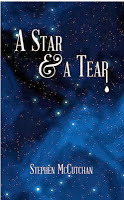
A Good Mystery
A good mystery helps restore
order and makes sense out of something that is unexplainable in our society.
People do not like to live in a society that doesn't respond to logic. How do
you protect yourself if there is not a logical explanation for what is
happening? When we experience brokenness in our society, we need someone to fix
what is broken and fill the hole in our universe that threatens the logic of
our lives. The mystery can be personal, a mysterious death, or enter the area
of thrillers with a threat to our whole society. A good mystery helps us make
sense and restore order again.
An Anxious Society
The news seems dominated by
scandals and examples of forces beyond human control. In politics, think
Anthony Wiener, in religion think Jimmy Swaggart, in ecology think Tsunami or
Hurricane Sandy, in the economy recall the large banks and investment firms
fiascos. On a personal level, we hear of crazy people with guns invading our
schools and terrorists threatening our embassies. How does a person make sense
of how to live in such a crazy world?
Fascination with Powers Beyond Our World
If the media is a barometer
of our society, we see an increased fascination with chaos, and with the
possibility of forces beyond our visible world touching our lives. Think of the
various versions of Dystopia in recent books and movies. Think also of the
popularity of stories about vampires, demons, and alien invasions as well as
the traumatic breakdown of our ability to control the forces of nature.
There is also an increased
interest in Super Heroes who can save us from ourselves. These range from
Superman, Spiderman, to friendly aliens like ET and the world of Harry Potter.
On a more personal level, there is the rise in popularity of Gurus with special
secrets of how to lose weight, find peace, become rich, etc.
Mysteries with a Spiritual Edge
This hunger in our society
for ways to restore order, either by human courage or mysterious forces from
outside our world, makes mysteries with a spiritual edge particularly
appealing. Such mysteries allow the reader to experience the chaos but also the
promise that life will ultimately make sense once the mystery is solved. By
adding the spiritual angle to the mystery, we address the interest in how we
can draw upon forces from beyond our visible world to assist us.
Some
mystery/thrillers like those written by Dan Brown, suggest that there is some
secret to be discovered that can unleash these powers into our world. In my
mystery novel, A Star and aTear, I
choose access to the spiritual forces through the more common experience of
religious disciplines, relationships, and reason. In my story, the demonic
aspect of life is represented by the toxic mixture of a distorted version of
sex and religion that wreaks terror in the community. The mystery is solved by
a healthier confrontation with the symbiotic relationship of sexuality and
spirituality.
Sex, Religion, Reason, and Hope
As one of the
characters in my novel says, "religion and sex are two of the most
powerful creative and destructive forces in our universe." We deny the
reality of these forces at our own peril. However, as the mystery is solved, we
make sense out of life again, terror is banished, and hope is present.
I invite
you to enter the conversation and join me in my effort "to build respect
for clergy one story at a time." Click here ,
enjoy the mystery, and consider if this would be a good book for discussion
among your friends.
Having a Discussion with Friends
If you have a
group of five or more, I am willing to provide you a discount code of 20% to
apply to your Amazon bill. Contact me at steve@smccutchan.com to secure the code.
The book includes provocative
questions at the end of each chapter to help your group probe some of the
themes that are in the book. As you discuss the book in your group, you may
also want to email two or three questions to me as the author and I will respond
as quickly as I can. We also may be able to find a common date in which we
could have a more personal conversation via Skype.
I hope you will enjoy A Star and a Tear.

Stephen McCutchan, writer, humorist, and
advocate for the care of clergy, is a Presbyterian (PCUSA) minister and
the author of Let’s Have Lunch: Conversation,
Race, and Community; Experiencing
the Psalms (recipient of the Jim Angell award from the Presbyterian
Writers Guild); Good News for a Fractured
Society, and three volumes of lectionary devotionals for pastors
plus two CDs, A Deep Well for the
Pastor and Laughter from the
Well.
Published on September 24, 2013 21:01
September 22, 2013
Interviews--My Checklist for Skype Interviews, Podcasts, or Radio
By Elizabeth S. Craig, @elizabethscraig
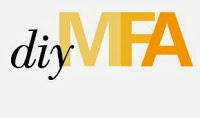
Although I don’t do a ton of interviews,
I probably do a live or recorded interview every few months. I especially like the recorded ones because I
figure if I say something dumb, they can edit it all out and make me look as if
I know what I’m talking about. :)
I’ve learned from my mistakes in the past
with these things, too. I think of my
house as being a very quiet place, but apparently, judging from my interview
experiences, there is actually plenty of noise pollution there. The pets, for one. My corgi will bark at the cats, at the
doorbell, and sometimes when she wants to go outside. The cats are male litter-mates and fight tooth
and nail with each other. Various
appliances make buzzer-like alarms when they’re done running. My UPS guy feels the need to hit the doorbell
when he drops off a package (I do appreciate this, but it makes the
aforementioned barking happen).
I try to schedule interviews when no one
is at home. This has worked with 90% of
my Skype interviews. But I’ve got some kind of radio-related curse. Whenever I have a radio interview, and the
ones I’ve done have unfortunately all been live, I will most certainly have a
sick child or a snow day on my hands (with school canceled). This is one reason
I know it’s a curse—y’all know it doesn’t snow down here in the American South
all that often.
So here’s
the checklist that I use before an interview, in the hopes it can help you out,
too:
Where are the children? Have I told them what I’m doing, so that they
won’t accidentally disturb me? Regardless of the fact you’ve told them about
the interview, put a sticky note on your door so that they’ll remember before
they knock.
Put the dog in a back bedroom.
Put the cats away (in a separate room
from the dog).
Put a sticky note on the door asking
Fed-X, UPS, and the mailman not to ring the doorbell.
Put my cellphone away or mute it.
Have water nearby. I will immediately have a coughing fit,
guaranteed, whenever I’m supposed to be recorded.
Skype
specific:
Do a sound/video check.
Turn on lots of lights in the house and
provide backlighting, too.
Wear lots more makeup than usual. Or, in
my case, wear make-up, period.
Pull out my webcam. It seems to be much
better-quality than the one that came with my laptop.
Remember not to look at the computer,
where I see the interviewer. I need to
look in the camera, or else I look distracted.
What’s in the background? Do I need to
dust? :)
Books.
Have a book nearby that I can hold up…if it’s that kind of
interview. Sometimes it’s not a promo
thing, it’s a craft thing and I might just have books on my dusted table in the background.
Radio and
podcast specific:
Don’t use my cellphone to call in. Use the house phone.
Turn off call waiting if you have it.
They’re fond of hearing the station’s
call letters in the broadcast.
For any
interview:
See if I can get the questions in
advance. It helps me give a more
thoughtful answer and just provides them with better content, in general.
Be able to sum up your book in one
sentence because you’ll usually be asked to tell the interviewer about your
most-recent release or what you’re working on now.
Last week’s interview was with Gabriela Pereira with DIYMFA for Lit Loft writing conference
and online course. You can see a little
of what we touched on at Gabriela’s site, here.
Have any tips I’ve missed about
interviews? Have you been
interviewed? How did it go?
Published on September 22, 2013 21:01
September 21, 2013
Twitterific
By
Elizabeth S. Craig, @elizabethscraig
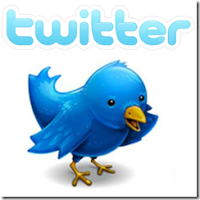
Twitterific links are fed into the Writer’s Knowledge Base search engine (developed by writer and software engineer Mike Fleming)
which has over 23,000 free articles on writing related topics. It's the search
engine for writers.
Sign up for our free newsletter for bimonthly writing tips and interviews with top
contributors to the WKB or like us on Facebook.
Mike Fleming and writing coach James Scott Bell are
offering an online, interactive, writing program to help make your next novel
great. It's called "Knockout Novel" and you can learn more about it
at Knockout Novel.com.
My tips for handling
writing and life: http://dld.bz/cQncA @DIYMFA
What’s Important in the Man
Booker Debate? http://dld.bz/cQn3H
/@Porter_Anderson @nicksidwell @meandmybigmouth
Tips for Creating an Online
Community: http://dld.bz/cQde4 @annerallen @AlexJCavanaugh
Making Your Book Promotable
– Before It's Published: http://dld.bz/cQnYB
@theprexpert
Jonathan Franzen takes on
ebooks and Amazon: http://dld.bz/cQrUx
@jenniferweiner @DennisAbrams2 @Porter_Anderson
4 Motivations of Traitors: http://dld.bz/cP6bT @mishaburnett
A poisons resource for crime fiction
writers: http://dld.bz/cP6d3 @clarissadraper
5 Tips for Writing and Marketing YA: http://dld.bz/cP9pc @NatalieWright_
Tips for describing characters: http://dld.bz/cP9pf @glencstrathy
Getting Rid of the Parts Readers Skip: http://dld.bz/cP9pn @SouthrnWritrMag
@DanWalshAuthor
Sell More on Amazon.com:Understanding
Keywords, Categories, and Amazon's Algorithm: http://dld.bz/cP9pt
@bookgal
Down the Rabbit Hole of Research: http://dld.bz/cP9py @JustBethanne @BTMargins
Creativity in pregnancy: http://dld.bz/cP9p6 @womenwriters @EleanorFitz
Keeping your Characters Consistent: http://dld.bz/cP9pC @patbertram
5 Examples of How Hyphens Help: http://dld.bz/cP9pH @writing_tips
13 Surprising Ways to Add Depth to a
Story: http://dld.bz/cP9pR @victoriamixon
Where 1 writer finds ideas for her
stories: http://dld.bz/cP9pX @melissadonovan
5 Common Problems in Your YA Manuscript: http://dld.bz/cP9pZ @howtowriteshop
Musicality and Reader Emotions: http://dld.bz/cP9qg @ingridsundberg
5 Issues That Affect How You Should Price
Your Book: http://dld.bz/cP9qw @tonyeldridge
A writing instructor on story arcs: http://dld.bz/cP9q7 @EdanL
Hugh Howey, Liliana Hart and Matthew
Mather: How To Write And Sell Books: http://dld.bz/cP9qN
@woodwardkaren
The Writing Wasteland: http://dld.bz/cP9re
What works and what doesn't with some
recent ebook covers: http://dld.bz/cP9rh
@JFBookman
Don't Split Infinitives – Fact or Myth? http://dld.bz/cP9rp @BrianKlems
Useful Writing Apps for Authors: http://dld.bz/cP9ry @wherewriterswin
What deals will publishers offer in five
years' time? http://dld.bz/cP9r9
@nailyournovel
Using Multiple Texts to Develop Your
Story World: http://dld.bz/cP9rP
@lisawengland
4 ways to Keep Your Story Interesting: http://dld.bz/cP9sA
Writing Fantasy Battles – A Look At
Strategy: http://dld.bz/cP9tc @fantasyfaction
Tips for reaching the teen market: http://dld.bz/cP9wf @InkSlingerPR
Recording things: Emotions and thoughts: http://dld.bz/cP9xG @Le_Shack
Screenwriting by Numbers: http://dld.bz/cP9xR @scottwsmith_com
How to Have a "Productive" Blog
Break: http://dld.bz/cP9yd
Creative Longevity: Always Come Out of
Another Hole: http://dld.bz/cP9yn
@SPressfield
15 of the most overused tropes in YA: http://dld.bz/cP9yu
Writing with Dyslexia: http://dld.bz/cPebJ @womenwriters
@Dandeliongirl01
You're Not a Real Writer Unless…: http://dld.bz/cP9ZS
@julie_glover
1 writer's pre-writing process: http://dld.bz/cP9ZY @roniloren
Anatomy of a book proposal: http://dld.bz/cPAad @lisajjackson
What's the Difference Between an In-Depth
Edit and the Over-Enthusiasm of an Editor? http://dld.bz/cPAaw
@ChilaWoychik
How to Hone in on Memory When Writing
Memoir: http://dld.bz/cPAaX @LilaQWeaver
@mroachsmith
Top Ten Tropes in YA: http://dld.bz/cPAb9 @StrangeChem
Neil Gaiman's Advice to Aspiring Writers:
http://dld.bz/cPAbS @brainpicker
7 simple rules for good writing: http://dld.bz/cPA3U @MsLianneLaroya
10 Bizarre Work Habits of Famous Authors:
http://dld.bz/cPA4c @JennyHansenCA
5 tips for being a better writer: http://dld.bz/cPA4m @storyfix
The Sounds of Writing – Why Some Pieces
Work & Some Don't: http://dld.bz/cPA4x
@ChilaWoychik
De-rotica – the Sad New Literary Genre: http://dld.bz/cPA4y @gregmischio
Tips for First-Time Horror Writers: http://dld.bz/cPA42 @WriterlyTweets @kculpepper1
7 Ways to Write to the Future: http://dld.bz/cPA4G @Orion_Magazine
Twitter's effect on writers and writing: http://dld.bz/cPPnM @walkthelinesldn @lucyinglis
Tips for approaching authors for guest
posts or interviews: http://dld.bz/cPPpn
@jodimeadows
Summer Lessons from an Unpublished Essay:
http://dld.bz/cPPp4 @BTMargins @andrealvolpe
Why Fan Fiction? http://dld.bz/cPPp8 @CarrieMesrobian
Becoming Shakespeare: http://dld.bz/cPPpC @TheEconomist
"Why I'm Not Writing YA (though I
often wish I was)": http://dld.bz/cPPqd
@KameronHurley
Gothic Intersections: Between the
Creative and the Critical: http://dld.bz/cPPqq
@GothImagination
You don't write books alone: http://dld.bz/cPPqy @AlissaLukara
Productivity for Writers: http://dld.bz/cPPq2 @KOMcLaughlin
How to win a Pulitzer Prize: http://dld.bz/cPPq9 @TheWriterMag
Tools to Organize Your Book Manuscript: http://dld.bz/cPPqE @grubwriters
10 Things 1 Writer Has Learned about
Crowdfunding (and why writers should try it): http://dld.bz/cPPqP
@MaryDeMuth
The Hidden World of the Typewriter: http://dld.bz/cPYVx @jjamesjoiner
The 5 Rookie Mistakes Writers Make When
Negotiating A Contract: http://dld.bz/cPYV6
@WritersRelief
5 Steps To Develop A Terrific Writing
Style: http://dld.bz/cPYWa
How Not To Treat Your Editor: http://dld.bz/cPYW4 @edsikov
Pet words: http://dld.bz/cPYWA
@pageturner @newyorker
2 tips for finding your writing voice: http://dld.bz/cPYWK @KatieAxelson
Freelancers: What to Put On Your Writer
Website if You're a Newbie: http://dld.bz/cPYWZ
@ticewrites
A Genealogy of Speculative Fiction: http://dld.bz/cPYXh @kaath09
6 ways to be more like Hemingway: http://dld.bz/cPYXs @fastcompany
1 writer's journey to publication and her
advice for writers: http://dld.bz/cPYXE
@KatZhang
Even if you don't live great stories, you
can write them: http://dld.bz/cPYXT
@ventgalleries
9 Epic Literary Burns: http://dld.bz/cPYYb @mental_floss
'Think About Characters Like a Sphere': http://dld.bz/cPYYg @joefassler
Poetry Isn't as Useless as a Lot of Poets
Say It Is: http://dld.bz/cPYYh @theatlantic
4 Ways To Create A Strong Antagonist: http://dld.bz/cPnaw @woodwardkaren
4 Ways to Improve Your Writing: http://dld.bz/cPz2m @ava_jae
What you should work on now: http://dld.bz/cPz8q @tannerc
7 Craft Lessons Every Writer Must Learn: http://dld.bz/cQdrH @Readwritestory
Steps to deal with writer's block: http://dld.bz/cQdsa @LeahMcClellan
5 Reasons Every Writer Should Journal: http://dld.bz/cQd6z @shewritesdotcom
The Power of Understatement in Fiction
Writing: http://dld.bz/cQd6D @JaneFriedman
@carmelbird
Do you need an agent to sell your book? http://dld.bz/cQd6M @deanwesleysmith
How Not to Be a Writer: 15 Signs You're
Doing It Wrong: http://dld.bz/cQd6V
@KMWeiland
An analysis of Agatha Christie's appeal: http://dld.bz/cQd7e @Writers_Write
The magic of the new idea: http://dld.bz/cQd8e @altait
17 writers' quotes on writing: http://dld.bz/cQd8t
The Grief Writer: http://dld.bz/cQd8K @elephantjournal
10 Tips on How to Write Less Badly: http://dld.bz/cQd9p @chronicle
23 Writers Who Were Famous by Age 23: http://dld.bz/cQd9Q @FrugalAndrea
The 6 Habits of Highly Tormented Writers:
http://dld.bz/cQdAp @gripemaster @BTMargins
On Being a Writer of Genre Fiction: http://dld.bz/cQdA3 @herebemagic
"Illegal downloading is moral
squalor" (and commenters weigh in): http://dld.bz/cQgVx
@passivevoiceblg
12 Famous Authors on Writer's Block: http://dld.bz/cQgV5 @A_WritersStudio
Scene Description Spotlight: "Saving
Private Ryan": http://dld.bz/cQgV6
@gointothestory
Secrets of writing short: http://dld.bz/cQgVD @katysteinmetz @time
Two More Ways for Writers to Milk the
Cash Cow: http://dld.bz/cQgVP @jamesscottbell
Vague settings: http://dld.bz/cQgVY @Ross_B_Lampert
Literary Architecture: http://dld.bz/cQgWX @parisreview @SadieStein
7 Advantages of a Verbal Pitch: http://dld.bz/cQgXd @rachellegardner
3 lessons for great storytelling: http://dld.bz/cQgXt @DrNickMorgan @Forbes
How to Create a Three-Phase Writing
Ritual: http://dld.bz/cQgX2 @DebraEve
@writeitsideways
Life and Death: Proofreading Your Novel: http://dld.bz/cQgXB @evmysterywriter
The Importance of Knowing Why You Write: http://dld.bz/cQnZy @LyndaRYoung'
Face It: You Wrote a Bad Book: http://dld.bz/cQpa9
Talking the Story: http://dld.bz/cQpaA @shalvatzis @TrishaNicholson
Using a graph to revise: http://dld.bz/cQpba
What Your Shelves Say About You: http://dld.bz/cQpbd @BTMargins @nicholebernier
How to Avoid Twitter-Fritter and
Facebook-Fail: http://dld.bz/cQpbf
@annerallen
Double trouble: two authors in the house:
http://dld.bz/cQpbh @nailyournovel
A Straightforward Technique to Make Your
Writing More Immediate and Effective: http://dld.bz/cQpd4 @chavelaque
How to Use KDP's Cover Creator: http://dld.bz/cQpdM @joleene_naylor
Quick Guide: Becoming a Power User on
Goodreads: http://dld.bz/cQpdU @Bookgal
Freelancing---Being a "Kept"
Writer: http://dld.bz/cQpeB @Jenpens2
What Should an Author Blog About? http://dld.bz/cQpeJ @annerallen
How to Build Engagement With Story,
Strategy, and Structure: http://dld.bz/cQs6u
@JFBookman
42 Fiction Writing Tips for Novelists: http://dld.bz/cQs6y @melissadonovan
15 Places to Promote Your Book for Free: http://dld.bz/cQs65 @jasonboog @galleycat
Should writers branch into print instead
of offering only ebooks? http://dld.bz/cQs7j
@JanetKGrant
Top Six Agent Pet Peeves: http://dld.bz/cQs7n @LynnetteLabelle
The $55 Wooden Pencil: http://dld.bz/cQs7s @ChandlerWrites
4 Reasons You Procrastinate and How to
Break the Cycle: http://dld.bz/cQs8c
@MenwithPens
The Alphabet in Crime Fiction:
Technology: http://dld.bz/cQs8g @mkinberg
How Filmmakers Build Twitter Authority On
15 Minutes A Day: http://dld.bz/cQs8m
@raindance
Savvy Writing Advice from Famous Authors:
http://dld.bz/cQs8t @livewritethrive
8 Places to Look for Your Characters: http://dld.bz/cQs8x @victoriamixon
7 Ways You're Sabotaging Your Book Sales
Without Even Realizing It: http://dld.bz/cQs8M
@JonathanGunson
5 Reasons Why Perseverance is the Most
Important Quality for a Writer: http://dld.bz/cNf35
@Woollz
Using Multiple Texts to Develop Your
Story World: http://dld.bz/cP9rP
@lisawengland
Neil Gaiman's Advice to Aspiring Writers:
http://dld.bz/cPAbS @brainpicker
What you should work on now: http://dld.bz/cPz8q @tannerc
7 Craft Lessons Every Writer Must Learn: http://dld.bz/cQdrH @Readwritestory
Do you need an agent to sell your book? http://dld.bz/cQd6M @deanwesleysmith
Gothic Intersections: Between the
Creative and the Critical: http://dld.bz/cPPqq
@GothImagination
Writing About Shock and Trauma: http://dld.bz/cP5XR by @cateartios
Published on September 21, 2013 21:01



